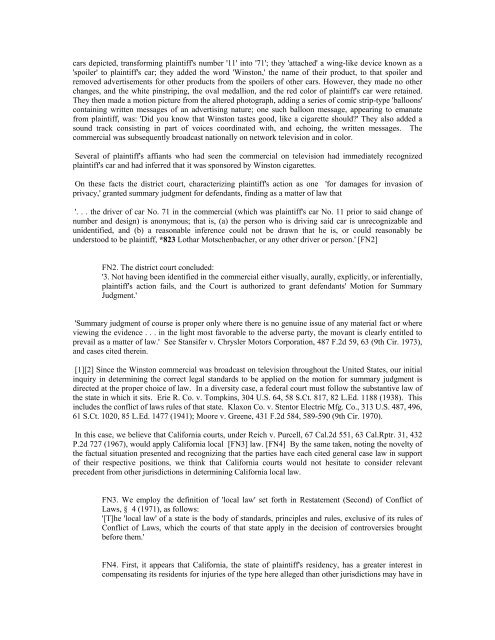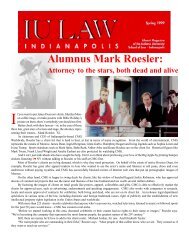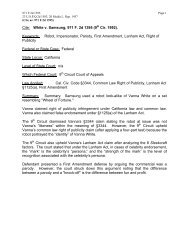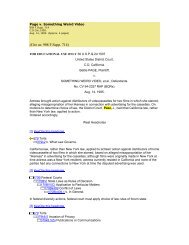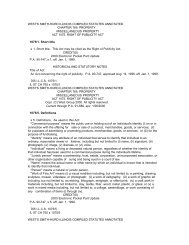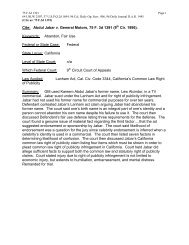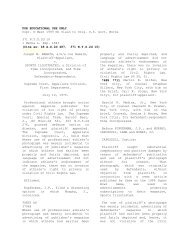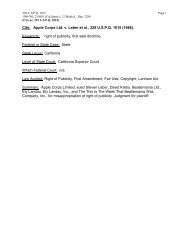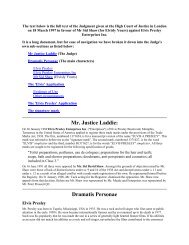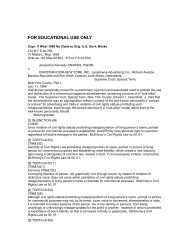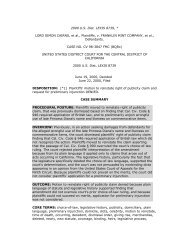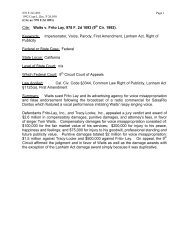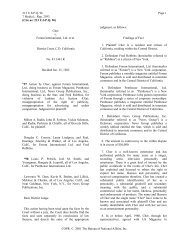Motschenbacher v. R.J. Reynolds Tobacco Company - Mark Roesler
Motschenbacher v. R.J. Reynolds Tobacco Company - Mark Roesler
Motschenbacher v. R.J. Reynolds Tobacco Company - Mark Roesler
Create successful ePaper yourself
Turn your PDF publications into a flip-book with our unique Google optimized e-Paper software.
cars depicted, transforming plaintiff's number '11' into '71'; they 'attached' a wing-like device known as a'spoiler' to plaintiff's car; they added the word 'Winston,' the name of their product, to that spoiler andremoved advertisements for other products from the spoilers of other cars. However, they made no otherchanges, and the white pinstriping, the oval medallion, and the red color of plaintiff's car were retained.They then made a motion picture from the altered photograph, adding a series of comic strip-type 'balloons'containing written messages of an advertising nature; one such balloon message, appearing to emanatefrom plaintiff, was: 'Did you know that Winston tastes good, like a cigarette should?' They also added asound track consisting in part of voices coordinated with, and echoing, the written messages. Thecommercial was subsequently broadcast nationally on network television and in color.Several of plaintiff's affiants who had seen the commercial on television had immediately recognizedplaintiff's car and had inferred that it was sponsored by Winston cigarettes.On these facts the district court, characterizing plaintiff's action as one 'for damages for invasion ofprivacy,' granted summary judgment for defendants, finding as a matter of law that'. . . the driver of car No. 71 in the commercial (which was plaintiff's car No. 11 prior to said change ofnumber and design) is anonymous; that is, (a) the person who is driving said car is unrecognizable andunidentified, and (b) a reasonable inference could not be drawn that he is, or could reasonably beunderstood to be plaintiff, *823 Lothar <strong>Motschenbacher</strong>, or any other driver or person.' [FN2]FN2. The district court concluded:'3. Not having been identified in the commercial either visually, aurally, explicitly, or inferentially,plaintiff's action fails, and the Court is authorized to grant defendants' Motion for SummaryJudgment.''Summary judgment of course is proper only where there is no genuine issue of any material fact or whereviewing the evidence . . . in the light most favorable to the adverse party, the movant is clearly entitled toprevail as a matter of law.' See Stansifer v. Chrysler Motors Corporation, 487 F.2d 59, 63 (9th Cir. 1973),and cases cited therein.[1][2] Since the Winston commercial was broadcast on television throughout the United States, our initialinquiry in determining the correct legal standards to be applied on the motion for summary judgment isdirected at the proper choice of law. In a diversity case, a federal court must follow the substantive law ofthe state in which it sits. Erie R. Co. v. Tompkins, 304 U.S. 64, 58 S.Ct. 817, 82 L.Ed. 1188 (1938). Thisincludes the conflict of laws rules of that state. Klaxon Co. v. Stentor Electric Mfg. Co., 313 U.S. 487, 496,61 S.Ct. 1020, 85 L.Ed. 1477 (1941); Moore v. Greene, 431 F.2d 584, 589-590 (9th Cir. 1970).In this case, we believe that California courts, under Reich v. Purcell, 67 Cal.2d 551, 63 Cal.Rptr. 31, 432P.2d 727 (1967), would apply California local [FN3] law. [FN4] By the same taken, noting the novelty ofthe factual situation presented and recognizing that the parties have each cited general case law in supportof their respective positions, we think that California courts would not hesitate to consider relevantprecedent from other jurisdictions in determining California local law.FN3. We employ the definition of 'local law' set forth in Restatement (Second) of Conflict ofLaws, § 4 (1971), as follows:'[T]he 'local law' of a state is the body of standards, principles and rules, exclusive of its rules ofConflict of Laws, which the courts of that state apply in the decision of controversies broughtbefore them.'FN4. First, it appears that California, the state of plaintiff's residency, has a greater interest incompensating its residents for injuries of the type here alleged than other jurisdictions may have in


